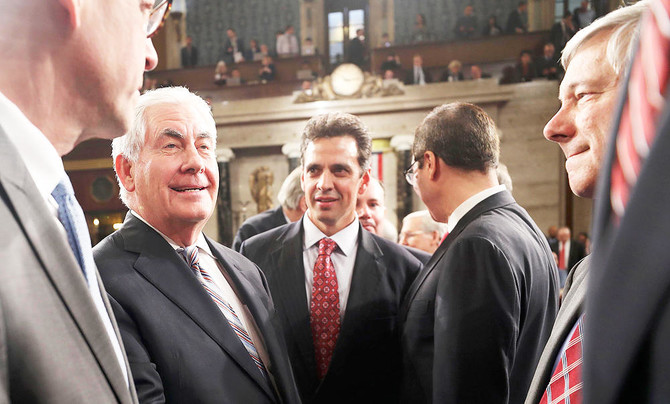WASHINGTON: After a three-month halt by the Obama administration on a $390 million arms sale to Saudi Arabia, the Trump Cabinet has taken initial decisions to resume the sale after Congress’ approval.
A US State Department spokesperson told Arab News: “As a matter of policy, we don’t comment on proposed arms transfers until they’re formally notified to Congress.”
But there have been no denials by the Trump administration of reports that resuming the arms deal has been approved by Secretary of State Rex Tillerson this week.
The Washington Post reported Wednesday that “the State Department has approved a resumption of weapons sales to Saudi,” in a reversal of a decision made in December by the Obama administration “to suspend the sale of precision guided munitions to Riyadh” in protest at Arab Coalition actions in Yemen.
The full resumption and delivery of arms will not be immediate, however. Under US law, it would require a final interagency decision to formally present the proposed sales to Congress. After that, there will be a 30-day notification period before moving forward.
Also, Tillerson’s approval would require the “White House backing to go into effect,” the Washington Post reported.
The State Department spokesperson that Arab News spoke to said any decision to resume arms sales does not imply a lack of concern over civilian casualties in Yemen, and the US urges all sides to take additional measures to mitigate against the risk of civilian harm.
The US official added: “More generally, we continue to believe that a political settlement of the Yemen conflict offers the best mechanism for all parties to secure their interests.”
Another US official framed the decision to resume sales around Trump’s counter-Iran efforts. The official told the Washington Post: “We’ll be looking for ways to blunt Iranian malign influence in the region. And we’ll be looking for all the tools that the US government has... I think you have to look at Yemen.”
Hussein Ibish, a resident senior scholar at the Arab Gulf States Institute in Washington (AGSIW), told Arab News: “The Trump administration’s decision to release the long-scheduled weapons sale to Saudi Arabia isn’t a surprise.”
In terms of policy, Ibish added: “Trump, Tillerson and US Secretary of Defense James Mattis have all signaled a strong interest in maintaining a strong military posture toward Iran, and close cooperation with allies such as Saudi Arabia.”
However, Ibish said: “Even under (Barack) Obama or (Trump’s former campaign rival) Hillary Clinton, the sale would ultimately have gone ahead because of the strong American interest in the outcome in Yemen and maintaining close security ties to Saudi Arabia.”
Trump team en route to resuming arms sale to Saudi Arabia
Trump team en route to resuming arms sale to Saudi Arabia











